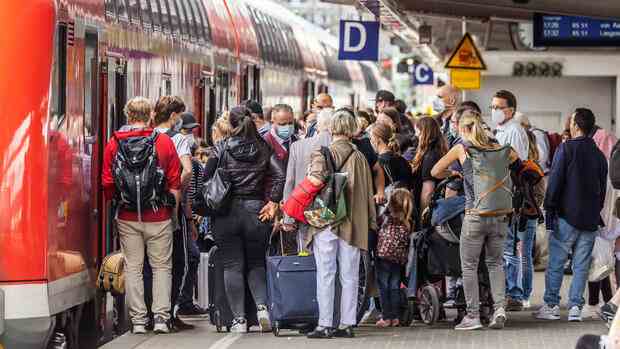Berlin The federal states will again discuss the implementation of planned relief in the energy crisis with Chancellor Olaf Scholz (SPD) this Thursday. There is still a need for clarification with regard to support for companies and the 49-euro ticket for local transport.
A report by the Federal Audit Office brings explosiveness to the meeting. The auditors advise the federal government not to make an expensive compromise with the states just to push through the planned Germany ticket for local and regional transport. Rather, he should not transfer more money for local transport until a modernization and expansion plan with clear goals for local transport is available.
“The financing requirements for future local public transport should be determined on a reliable basis,” write the auditors in a report to the Budget Committee of the German Bundestag. It is available from the Handelsblatt.
The trigger for the report is the plan by the federal and state governments to introduce a nationwide valid 49-euro ticket for local and regional transport after the 9-euro ticket in the coming year. Before that, however, the states demand that the federal government keep its promises from the coalition agreement and permanently transfer more money for local public transport.
Top jobs of the day
Find the best jobs now and
be notified by email.
The politically explosive recommendation of the Federal Audit Office reads: The traffic light coalition should not pass the corresponding regionalization amendment law on December 21 in the Bundestag as planned.
It is about a total of 17 billion euros that the federal government wants to transfer to the federal states by 2030. One billion euros of this should flow this year alone. “According to the assessment of the Federal Court of Auditors, the federal states are hardly in a position to appropriately spend the additional regionalization funds of one billion euros in 2022,” says the report.
For years, the auditors have been complaining about the federal government’s lack of control mechanisms. The FDP budget politician Frank Schäffler therefore sees the report as an alarm signal. “We should take the report seriously,” he told Handelsblatt. “The federal government pays to the states and in the end doesn’t know what happens to the money.”
Without money, the countries do not introduce a Germany ticket
The transport policy spokeswoman for the SPD parliamentary group, Dorothee Martin, rejected the criticism of the Court of Auditors. “Next week, the Bundestag will vote on the coalition factions’ draft law to increase regionalization funds,” she said. “Now this is the right step.” Regardless of this, the federal and state governments are currently negotiating an expansion and modernization pact for local transport.
As a first step, the federal government wants to increase the so-called regionalization funds for the federal states by law. According to this, 10.44 billion euros flowed in this year and in the following years – instead of 1.8 percent as before – then three percent more. In 2030 it would be 13.8 billion euros.
“The system should still be provided with the necessary financial resources in 2022 so that public transport can make its contribution to the traffic turnaround and the achievement of climate protection goals at least at the current level,” explains the Federal Ministry of Transport. The Federal Court of Auditors quotes this justification in its report.
In the coming year, the legal basis for the Deutschlandticket is to be put in place. The federal and state governments have already agreed to share the initially forecast costs of three billion euros. However, they are obviously not enough, as the local transport industry explained after initial consideration of the ticket. Since it is unclear who will bear the possible additional costs, the companies do not want to continue the preparatory work for the ticket.
The officials of Federal Transport Minister Volker Wissing (FDP) and Federal Finance Minister Christian Lindner (FDP) therefore explain in their statement that the federal states were not prepared to conclude an expansion and modernization pact at this point because of the unresolved financing of local transport. It should actually be in this year and be the basis for financial negotiations. The pact is now being sought “in spring or autumn 2023”, the auditors continue to quote the ministries.
The role of local transport is still unclear
A working group has been meeting since the beginning of the year. In it, representatives from the federal and state governments discuss how local transport can be modernized and enabled to transport twice as many people as before by 2030, thus making a contribution to climate protection.
At the same time, however, public transport serves to provide services of general interest and must therefore be financed largely from public subsidies. The countries themselves have already demanded several billions to achieve the climate goals.
“Before a permanent increase in regionalization funds,” the auditors recommend, consultations on the future orientation of local transport should be completed. “As long as the federal government does not commit itself unilaterally, there is still the opportunity to reach an agreement with the federal states that takes mutual interests into account in a balanced manner.”
Federal Transport Minister Wissing had argued in this way for a long time. In the meantime, however, it is more important to him to introduce the successor ticket quickly. While he is hoping for March 1, 2023, the local transport industry does not expect it before April 1 – provided that it has been clarified beforehand who will bear the additional costs.
According to the Basic Law, the federal government is responsible for ensuring that local transport is adequately funded. The federal states and municipalities are responsible for the local transport itself.
More: E-car buyers have to fear for their purchase premium.
